


insightssuccessmagazine com Scan the QR and fill the form. — Get Featured In Where Top Business Minds share their Success Stories.






insightssuccessmagazine com Scan the QR and fill the form. — Get Featured In Where Top Business Minds share their Success Stories.


Theglobalhealthcarelandscapeisundergoingaprofoundandfar-reachingtransformation.Drivenby
rapidtechnologicaladvancements,evolvingcaredeliverymodels,andtheincreasingcomplexityof public health concerns, the industry is experiencing a period of unprecedented change. From the integrationofartificialintelligenceanddata-drivendiagnosticstotheriseofpersonalizedmedicineandvirtual care platforms, innovation is reshaping how care is accessed, delivered, and measured.At the same time, patientexpectationsareshifting.Individualsnowseekmoretransparent,accessible,andholistichealthcare experiences that extend beyond traditional clinical settings. In this dynamic environment, the demand for visionaryandadaptiveleadershiphasneverbeengreater Healthcareleaderstodaymustgobeyondmanaging existingsystems.Theymustalsoanticipatefutureneeds,embraceinnovation,andnavigateuncertaintywith clarityandpurpose.Theirroleisessentialinguidingorganizationsthroughdigitaltransformation,fostering collaborativeecosystems,andensuringthatcareremainspatient-centered,equitable,andsustainable.
Insights Success in its recent edition titled as The 10 Most Impactful Healthcare Leaders Charting the Pathto2025featuresagroupofvisionaryindividualswhoarenotonlyaddressingthecurrentchallengesin healthcare but are also shaping the future of the industry These leaders exemplify the core qualities of transformative leadership, including collaboration, adaptability, and a strong commitment to improving patientoutcomes.Theindividualshighlightedbringadiverserangeofexpertise,includinggroundbreaking research, digital health innovation, healthcare policy reform, and patient-centered care. Each has shown exceptional foresight, resilience, and dedication to advancing healthcare systems that positively impact millions of lives around the world.Theirefforts span the implementation of emerging technologies such as artificialintelligence,telemedicine,andprecisionmedicine.Inaddition,theyarefocusedoncriticalinitiatives aimedatenhancinghealthequityandexpandingaccesstoqualitycare.
As healthcare continues to face pressing challenges, such as an aging population, the rise of chronic conditions, and growing disparities in access and outcomes, the role of visionary leadership becomes increasingly vital. The individuals featured in this edition stand as a testament to what is possible when innovation,compassion,andstrategicinsightarebroughttogether.Theirworkisnotonlyshapingthepresent butalsopavingthewayforamoreresilient,inclusive,andtechnologicallyadvancedhealthcaresystem.Their effortsserveasasourceofinspirationandsetastrongexampleforprofessionalsacrosstheindustrywhoare committedtodeliveringbettercareandbuildingahealthierfutureforall.
Haveagreatreadahead!



Suloshini Krishna Singh’s
Dreaming Big, Taking Ac�on and Embracing Imperfec�on Guide to Success
From Invention to Industry
The Future of Scien�fic Innova�on Trends
Operational Excellence
Top Healthcare Leadership Trends
Shaping the Industry
From Laboratory to Bedside
Transforming Pa�ent Care Through Medical Innova�on




AlbarahElkhani SeniorVicePresident
Edward R.Schiettecatte Founder&CEO
EhabZawaideh GeneralManager Ultrasound-EAGM
M42Health m42.ae
StichtingTRAINM Nederland trainm.com
GEHealthCare gehealthcare.com
AlbarahElkhaniistheSeniorVicePresidentatM42Health, leadingglobalhealthcarestrategy,integratingadvanced medicaltechnologiesandpersonalizedcaretoimprovehealth outcomes.
EdwardisFounder&CEOofStichtingTRAINMNederland, leadingneurorehabilitationwithroboticsandAItohelp patientsrecoverfromneurologicalinjuriesandchronic conditions.
EhabistheGeneralManagerforUltrasoundatGEHealthCare EAGM,leadingimaginginnovationandadvancingdiagnostic technologyacrossEurope,Africa,andtheMiddleEast.
EliudUrquidi Co-founder
AGROCORPLE avocadosaljoe.com
JacquiSanders ManagingDirector, HealthcareandSenior Partner
JeanKaseya PresidentFormer HeadofInvestment Operationsand Co-Chair, OperationsCommittee
KaileZagger ManagingDirector
MaximKholin CO-Founder
FleishmanHillard fleishman.com
AfricaCDC africacdc.org
ProvinceFirm provincefirm.com
Gero gero.ai
EliudisCo-founderofAGROCORPLE,advancingagricultural innovation,sustainablefoodsystems,andruraldevelopment acrossLatinAmericathroughtechnology-drivensolutions.
JacquileadshealthcarecommunicationsasManagingDirector andSeniorPartneratFleishmanHillard,drivingstrategicglobal initiative andclientengagementacrosshealthsector.
JeanisthePresidentofAfricaCDC,formerlyledinvestment operationsandco-chaireditsOperationsCommittee,steering regionalhealthstrategiesandfinancialgovernanceinpublic healthinnovation.
KaileservesasManagingDirectoratProvinceFirm, specializinginoperationaltransformationandcorporate strategyforcompaniesfacingfinancialandorganizational challenges.
MaximistheCo-FounderofGero,buildingAI-drivenhealth platformstostudyagingandextendhealthylifespanthrough datamodelingandpharmaceuticalresearch.
NajlaWortham President
RockCreekFoundation rockcreek.org
NajlaservesasthePresidentofRockCreekFoundation, leadinginitiativesthatsupportmentalhealthand developmentaldisabilityservicestoenhancecommunity inclusionandqualityoflife.



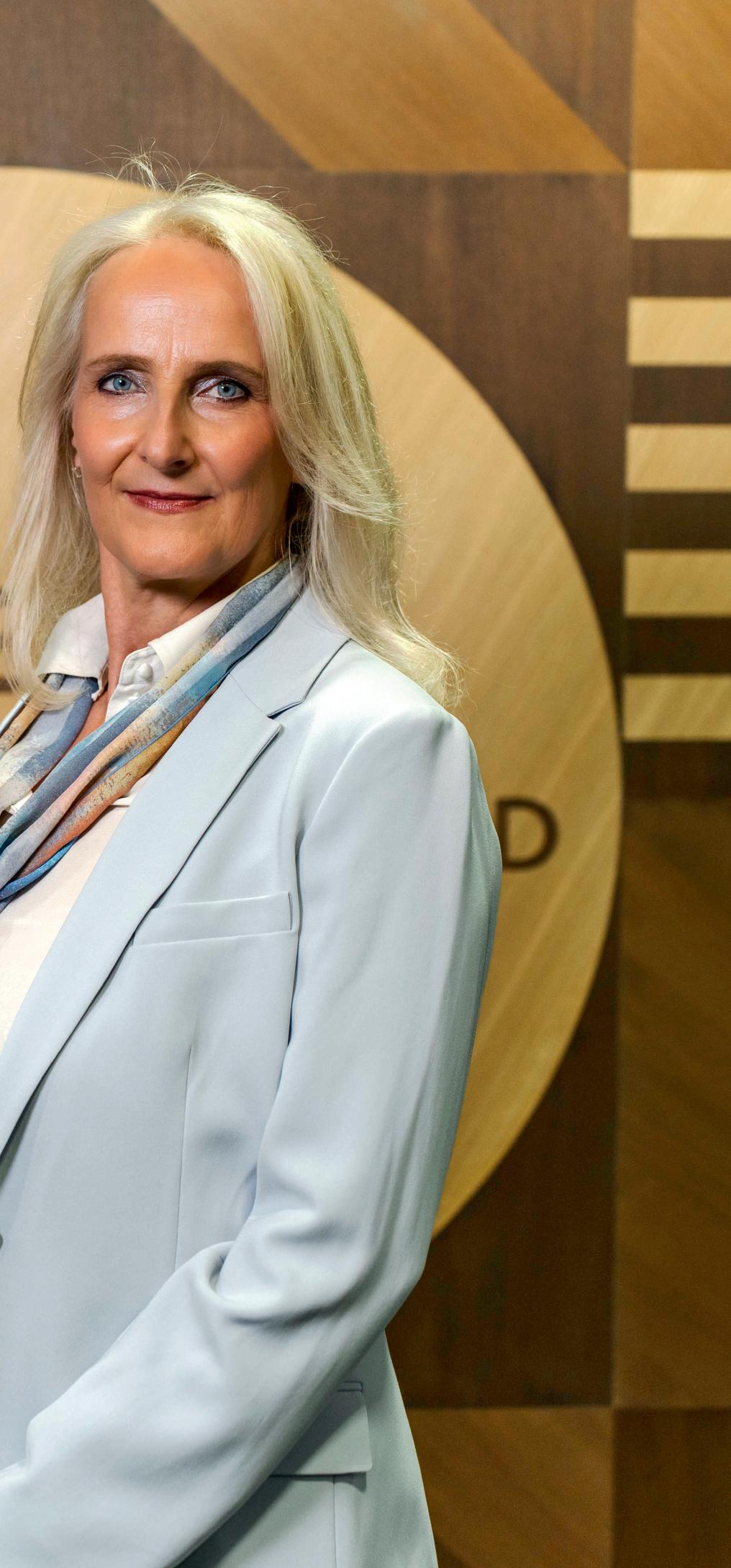


Jacqui Sanders leads the UK health and life sciences divisionatFleishmanHillard,excellingasahealthcare communicationsprofessional.Hersuccessstemsfrom a dedication to bringing innovative medicines to those in need,dramaticallyimprovinglives.
In an era marked by scientific breakthroughs and evolving patient requirements, healthcare communications serve as a crucial bridge between innovation and impact. Groundbreaking developments must extend beyond laboratoriesandclinicaltrialstotransformreal-worldpatient outcomes.
Today'shealthcarelandscapeiscomplexandever-changing, driven by technological disruption, rising transparency expectations, and the imperative to build trust with diverse stakeholders, including patients, clinicians, regulators, and investors. Against this backdrop, the role of healthcare communicators has evolved from simple messengers to proactive collaborators in innovation and patient advocacy They are tasked not merely with conveying information but with crafting narratives that foster collaboration, influence policychanges,andenhancehealthoutcomes.
This transformation requires leadership that is responsive, compassionate,anddeeplyattunedtothepatientexperience. Jacqui Sanders exemplifies such leadership. She has carved out a remarkable career, demonstrating the vision and resilienceneededtoadvancehealthcarecommunicationsand setnewindustrystandards.
Jacqui's journey towards becoming an influencer in healthcarecommunicationswasanythingbutdirect,buteach turn was purpose-driven. Having had a strong life science background, Jacqui was first attracted to public affairs because she wanted to make a difference in healthcare. Her move into healthcare communications, however, was the turning point that enabled her to combine scientific knowledgeandpassionforeffect.Thisactionallowedherto champion access to new medicines developed by the pharmaceutical sector, bridging the distance between sophisticatedscientificadvancementsandtheactualneedsof patients.
Early in her professional life, Jacqui was privileged to work withateamthatbelievedinstrategicthinking,somethingthat hasstayedatthecoreofherleadershipphilosophy


Her experiences extend beyond the professional realm; supporting her daughter’s professional tennis aspirations offered her unique insights into building high-performing teams, fostering resilience, and embracing agility. These lessons in leadership and performance under pressure have profoundly influenced her people-centred approach, which balances strategic excellence with a deep understanding of humandynamics.
Jacqui’s leadership style is fundamentally people-centred, a philosophy rooted in the belief that exceptional results are driven by people, not just processes. In today’s complex healthcare environment, this means creating conditions whereindividualsandteamscanthrive,cultivatingculturesof collaboration, trust, and accountability, while maintaining a sharp focus on outcomes. The pressures on businesses are immense,requiringresilience,speed,andimpact.Jacquihas learned to adjust her leadership to these needs by incorporating technology and agility, especially during the COVID-19pandemic,whichwasacriticalturningpoint.






Empathy has now become a strategic tool instead of a soft skill in this new environment. Jacqui uses empathy to get to thedepthofclientrequirements,createtrustamongstteams, anddevelopmoreeffectiverelationships.Herstylecombines scienceliteracywithemotionalintelligencesothatclientsare heard, teams are enabled, and communications connect at a human level where it counts most This contemporary definitionofpeople-firstisnotsomuchaboutbeingniceasit is about delivering tangible business outcomes and meaningfulchangeinhealthcare.
Changing Perspectives: From “What's the Matter with You?”to“WhatMatterstoYou?”
One of Jacqui’s core beliefs is that healthcare communications must move beyond traditional paradigms thatfocussolelyondiseaseordysfunction.Instead,itshould embraceamoreholisticunderstandingofpatients’livesand priorities. This shift from asking “What’s the matter with you?” to “What matters to you?” is fundamental to driving meaningfulinnovationandpatient-centredcare.
Jacquihasbeenapioneerinincorporatingpatientvoicesinto each phase of healthcare development and communication. Her teams realized years ago the strength of co-creating solutionswithpatientsandhealthcareprofessionalsdirectly. Since then, this practice has grown stronger, bolstered by strict research and analytics that yield profound understandingofthepatientexperience.
These insights, fueled by data, guide client decision-making in research and development, driving innovation from the ground up and influencing communications planning from initialresearchtocommercialization.
Through patient engagement and advocacy capabilities, Jacquimakessurethatthevoiceofthepatientisnotanadd-on butacoreanchor.Herteamsuseprofoundculturalinsightand behavioural science to reach out to stakeholders in meaningful ways, from patients and healthcare providers to investors and staff All messages are grounded in real experience, enabling clients to show how their innovations really connect and make practical impacts on individuals' healthjourneys.
Jacqui’s leadership philosophy is uniquely enriched by her experiencesinelitesportsmanagementandeducation,which mayseemdistantfromhealthcarecommunicationsbutshare strikingparallels.Theprinciplesofunderstandingindividuals deeply, building the right development strategies, and fosteringresilienceandagilityareuniversal.Whetherguiding an athlete’s career or leading a healthcare communications team,thegoalistounlockfullpotentialanddriveimpactful change.
Developing a game plan for an athlete’s success mirrors settingaclearvisionandstrategyforateamorbusiness.Bold visionsinspire,buttheymustbebrokendownintoachievable milestones,withflexibilitytoadaptwhennecessary.Jacqui’s exposure to top sports psychologists and performance under pressure has sharpened her ability to support teams in demanding situations-staying calm, thinking decisively, and reducingunnecessarydistractions.
This systematic, data-driven process of continuous improvement-learning from success and failure-is strictly followedinherleadership.Theoutcomeisauniquestylethat inspires, encourages teamwork, and utilizes each person's strengths to build high-performing teams that can achieve excellenceinthechallenginghealthcaresetting.
Her success has its foundation in being able to build highperforming teams through fostering environments where individuals are trusted, heard, and feel a part of something greater

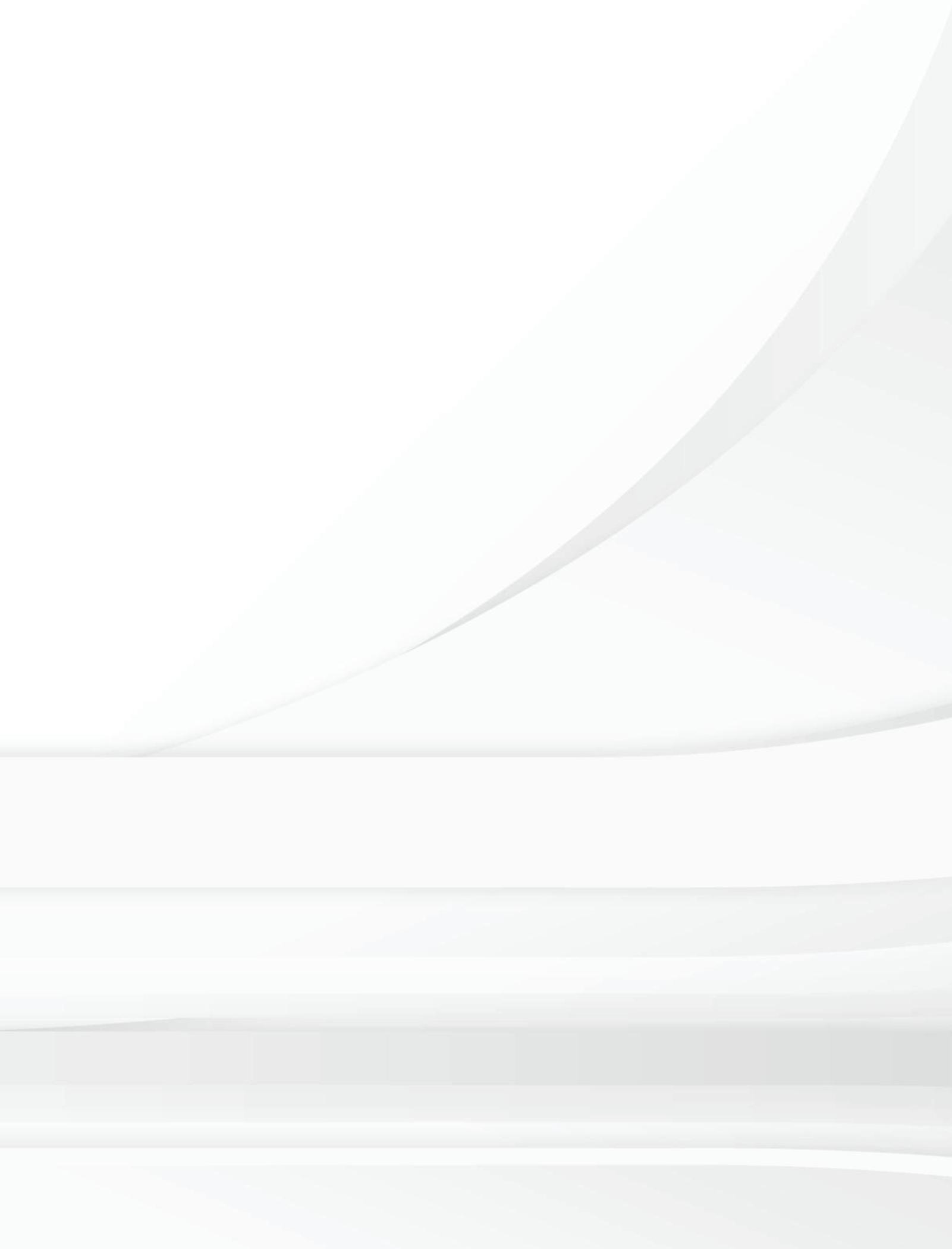
Herpeople-focusedleadershipoflifesciencescommunications is built on transparency, a clear standard for impact, and promotingconstructivechallengeinsteadofjustconsensus.
Deliberatecollaborationisthewayforward.Jacquiassembles experts from a range of functions-scientific narrative, behaviouralpsychology,policy,patientinvolvement,culture, creative, media, and digital-to make sure that all sides are explored. It is not a hierarchical approach but about getting the best thinking quickly and efficiently. Respecting specialists and psychological safety allow team members to voicetheiropinionsandcontributesignificantly
Real-time feedback is central to this culture-supportive, actionable, and growth-oriented approach. The focus is on deployingindividualstrengthstoachieveexcellence.Clients seekJacqui’steamsnotonlyforproblem-solvingbutalsofor resilience,speed,andresults.Thesequalitiesareembeddedin the team culture through shared purpose, mutual support, clarity,technologyintegration,andempowerment.
Jacqui recognizes that balancing leadership at the highest levelwithpersonalresponsibilitiesisalifelongprocess.She insistsonusingperspective,understandingthateventhemost difficultcircumstancescanbemanagedthroughkindnessand re-calibration. Spending time with family, friendships, and naturegivesherenergyandbalance.
Her multiple interests-art, music, literature, and relating to people from all walks of life-give her work new eyes and a humanelement.Spreadingjoyandlaughterintheworkplace prevents burnout and creates a positive atmosphere. This
integratedviewoflifeandworkmakesherleadershipricher and the multifaceted, high-pressure healthcare communicationsworldssheoperatesinmoresatisfying.
Lookingtothefuture,Jacquiisoptimisticaboutthechangemaking potential of artificial intelligence (AI) in healthcare communications.Sheencouragesaspiringprofessionalstobe motivated by a sincere desire to make a positive impact, couplingscientificinterestwithcommunicationabilitiesand asharpunderstandingofAIcapabilities.
Critical thinking and strategic thinking are still essential, alongwithskillsinAItoolsfordataanalysis,contentcreation, andaudiencetargeting.ButJacquiemphasizesthatuniquely humancapabilities-creativity,empathy,andcriticalthinkingwill become increasingly important. The ability to work in teamswhereAIisacollaborator,notasubstitute,iscriticalto achievingmaximumimpact.
Jacqui’s vision is to empower teams to deliver unparalleled impact by integrating AI into multifunctional, data-driven collaborationwhilepreservinghumaninsightandcreativity. Strategy development will become hyper-targeted and audience-centric, cutting through content noise with authenticityandaccuracy
Communications will more and more link reputation management,R&Dinnovation,commercialization,corporate affairs, and government relations-maximizing ROI and extending impact. Jacqui is dedicated to furthering sector specializationtodeliverclientswiththeadvisoryexperience theyrequireinthisfast-changingenvironment.
Jacqui’slegacyisdeeplyintertwinedwiththeevolvingroleof the patient in healthcare. She aspires to be known for championingafuturewherepatientvoicesaretrulycentralto policy, regulation, R&D, and communications-powered by herdistinctivepeople-centredleadership.
Inatimeplaguedbydisinformation,thiskindofleadershipis essential to establishing and sustaining trust in science, industry, and government through clear and effective communications.Wherevershegoes,Jacquiiscommittedto showinghowcontemporary,human-focusedmethodsarethe strongest means to create meaningful and enduring positive effectinhealthcare.



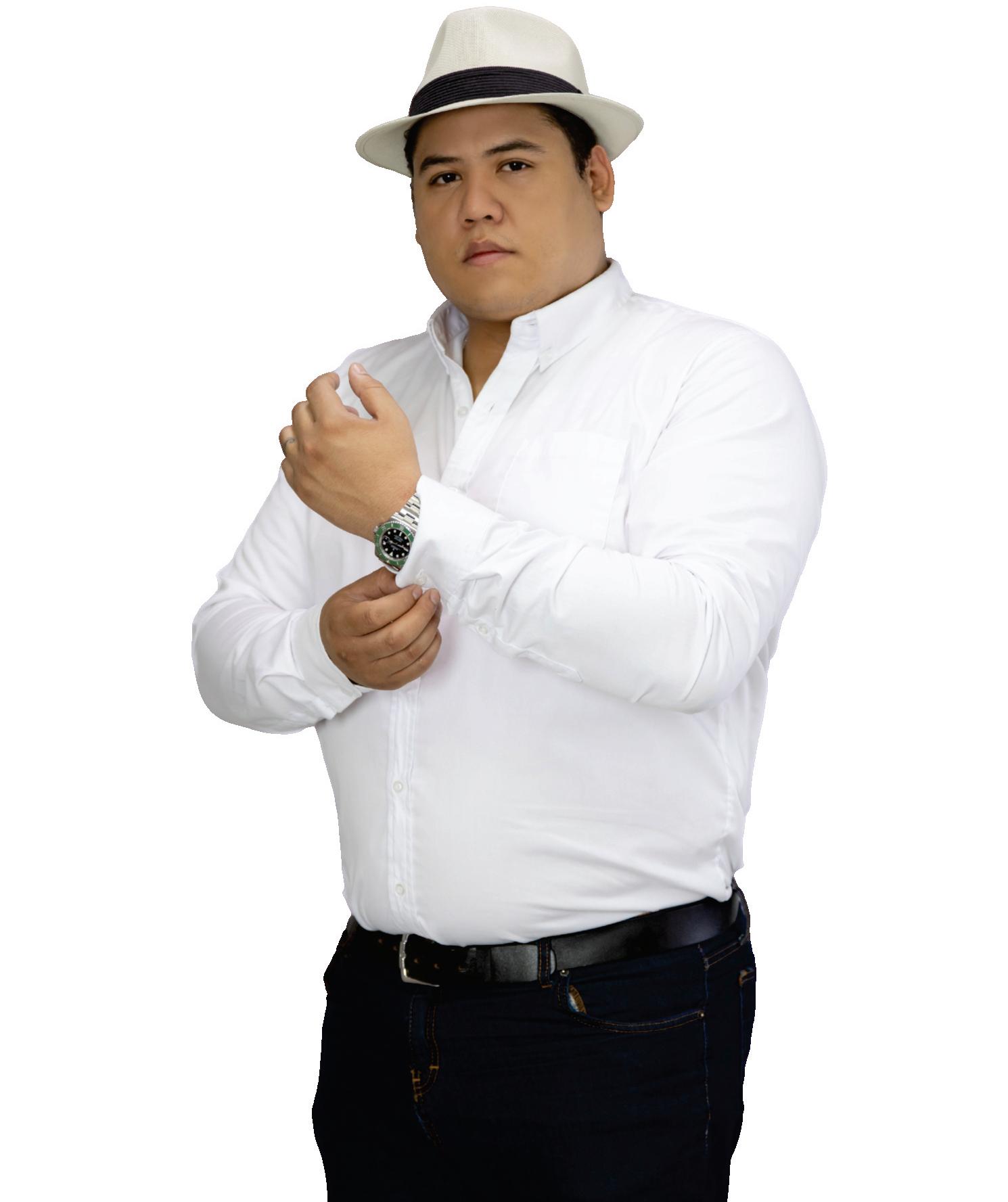








Thehealthsectorisconstantlyexperiencingprofound change being driven by the intersection of new technology, shifting patient expectations, reorganized workforce realities, and ongoing policy redefinition Emerging technologies such as artificial intelligence, digital health platforms, and telemedicine are reshapingthewaycareisbeingdeliveredtomakeitquicker, moreindividualized,andmoredata-centric.Andatthesame time,thepatientsoftodayaremoreinformedandempowered anddemandongoingtransparency,convenience,andgreater engagementinhealthdecisions.Leadershipintoday'shectic pace isn't just beneficial—it's required. Healthcare leaders need to do more than provide clinical and operational excellence;theyneedtobuildasustainedcultureofongoing innovation, foster adaptive thinking, and lead organizations through gargantuan change efforts. Value-based care—payment on the basis of outcome rather than service volume adds yet another level of complexity to the equation,demandingthatleadersbalancecost-effectiveness, quality, and patient satisfaction. With the marketplace more integrated and outcomes-focused, leaders will have to be champions of cross-functional teamwork, astute data utilization,andadaptiveteamsthatcanperforminambiguity
Thisarticlehighlightsthemostnotablehealthcareleadership trendsthataredefiningandtransformingtheindustryin2025 andbeyond.
Adopting Digital Change and Data-Driven Decisionmaking
Healthcare leaders are more and more adopting data-driven decision-making and digital technologies to enhance performance, enhance patient results, and enhance organizationalefficiencyatallorganizationallevels.Withthe


integration of electronic health records (EHRs), machine learning, and artificial intelligence (AI), healthcare organizations are effective operations with enhanced actionableinsights.Executivesneedtobewiseenoughabout such technology so that they can make sound decisions and make strategic investments in platforms that serve the purpose and long-term vision of their organization Telehealth, remote patient monitoring, and digital therapeuticshavebecomemainstream,anddigitalfluencyis now a leadership competence for our contemporary healthcareculture.
And data-driven decision making is no longer a nicety for competitiveadvantageandregulatoryflexibility Healthcare executives should be utilizing real-time data analysis to monitor clinical outcomes, reduce costs, and identify trends before they become crises. This transformation requires leadersnotjusttounderstandinformation,buttoputtogether teams to decipher and respond to insights in the right way across departments. Through predictive population health analyticsorcustomizedtreatmentprotocols,dataisbecoming the basis of planning and action within health care, transformingdecision-makingandservicedelivery
The healthcare workforce has seen unprecedented pressures over recent times with pandemics, staff shortages, and escalating threats to care and services. Leadership attention then shifts to building strong, committed, and supported teamssothattheycandeliverhighperformanceinhardship. Leaders are being asked more frequently to invest in employee wellness programs, work-life integration, and building workplaces that reverse burnout and retain employeesatalllevels.Emotionalintelligenceasaleadership characteristic is also being recognized as a driver of trust, psychologicalsafety,andteamculturewithinteams.
Leadershipdevelopmentinhealthcareorganizationsisalsoa significant trend because healthcare organizations are undergoing generational leadership transition and growing complexity of care delivery. While certain experienced executives retire, there is a growing need for succession planningandthedevelopmentofnext-generationleaderswith evolving capabilities. Cross-functional collaboration, valuebasedcareeducationprograms,andinnovationareontherise, togetherwitheffortsforcontinuouslearningandsponsorship. Organizationswithsponsorshippipelinesofleadershiphavea greater likelihood of being in a position to face future challenges and ensure succession continuity and thus longtermorganizationalstabilityandsuccess.
Infact,mostcriticalamongthehealthleadershipimperatives of the era is ensuring health equity, inclusion, and culturally responsive care. Disease determinants of access to care, income,education,housing,transportation,andenvironment are increasingly known to be playing critical functions in bringing about better health for every segment. Leaders are beingaskedtoputequityintopurpose,strategy,andsuccess measureswithinorganizationswithexpectationsofrealizing sustainable outcomes. That involves collaboration with the community, increased access where communities are underserved,andcreatingmodelsofcarethataresensitiveto uniquelocalneedsandhealthvariations.
Besides, healthcare leaders are moving towards a more community-focused practice model with more emphasis on building trust and ongoing interaction with the community. They are looking beyond the traditional institutional silos to forge partnerships conducive to whole-person, preventive, andpopulation-basedcare.Eitherbymeansofmobileclinics, community health workers, or school health services, leadership is getting out there where the people are geographicallyandculturally Itisoneaspectofalargershift from episodic care to longitudinal relationship-based care withphysical,mental,behavioral,andsocialhealthintegrated intoasystem.
Healthcareleadershiprequiresacross-functionalskillsetthat weighsstrategicthinkingwithtechnicalexpertise,emotional intelligence, and local knowledge. As digital revolution acceleratesandsocialneedsevolve,successfulleaderswillbe thosewhoareabletoharnessdata,createresilientteams,and promote equity They require adaptive, visionary leadership thatcansteerhealthcareorganizationsthroughtheuncharted and towards an age of more effective, personalized, and equitable care. By staying attuned to these transforming trends, healthcare leaders can create lasting change and put theirorganizationsonthepathtolong-termsuccess.


Public health remains a pillar of societal well-being,
driving efforts to address global challenges such as disease outbreaks, health disparities, and climaterelated impacts. With its evolution shaped by scientific advancement and the push for equitable solutions, public health today relies heavily on visionary leadership, strategic innovation,andcollaborativeaction.
Jean Kaseya, Director General of Africa CDC, stands as a beacon of such transformative leadership. With a resultsdrivenandempatheticapproach,Jeaninspiresteams,fosters globalpartnerships,anddriveschangerootedinsustainability and inclusivity. His leadership combines innovation and practicality, with a firm commitment to empowering communities and strengthening health systems across the continent.
Africa CDC, a premier pan-African health institution, is tasked with enhancing the capabilities of African Member States to respond to health crises. Through evidence-based strategies, investment in advanced technologies, and strong partnerships,Africa CDC works to ensure no community is leftbehindinthepursuitofqualityhealthcare.
BorninKinshasa,DRC,Jean'spathwasshapedearlybyhis mother'sworkasanurseinalocalpublichospital.Witnessing the devastating toll of preventable diseases in underserved communities inspired him to become a medical doctor dedicatedtobridginghealthcaregaps.
Amonghiscareerhighlightsishisroleintheintroductionof the meningitisAvaccine inAfrica—a development that has significantly reduced the disease’s burden and marked a personalvictoryinhismissiontosavelives.
To tackle Africa’s multifaceted health challenges, Jean introducedthe5Cframework:
Community: Empowering local populations by designing healthprogramstailoredtotheirneeds,ensuringaccessibility eveninremoteareas.
Connectivity:Leveragingdigitaltechnologytosupportrealtime data collection, facilitating timely decisions and responses.
Capacity:Developinghumancapitalandinfrastructurewhile boosting local production of critical health supplies like vaccinesanddiagnostics.
Collaboration: Fostering partnerships with governments, international organizations, and regional bodies to promote sustainablesolutions.
Climate:Buildingclimate-resilienthealthsystemstoprotect vulnerablepopulationsfromenvironmentalhealththreats.
EveryactionatAfricaCDCisguidedbyscienceanddatato maximizeimpact.
Jean’sbackgroundingovernmentprovidedhimwithinsights into political navigation and strategic communication. At Africa CDC, he applies this expertise through global health diplomacy,advocatingforpoliticalsupportandfundingatthe highest levels to align public health with broader developmentagendas.
Healsoemphasizesthevalueofpublic-privatepartnerships. From UNICEF, he gained a focus on equity and prioritizing vulnerable populations. At GAVI, he saw firsthand how strategicalliancescanexpandvaccineaccessandstrengthen immunizationsystems.HisworkwithNGOsandUS-funded programsfurtherdeepenedhisunderstandingofcommunitybasedinterventionsandthepoweroflocalizedsolutions.
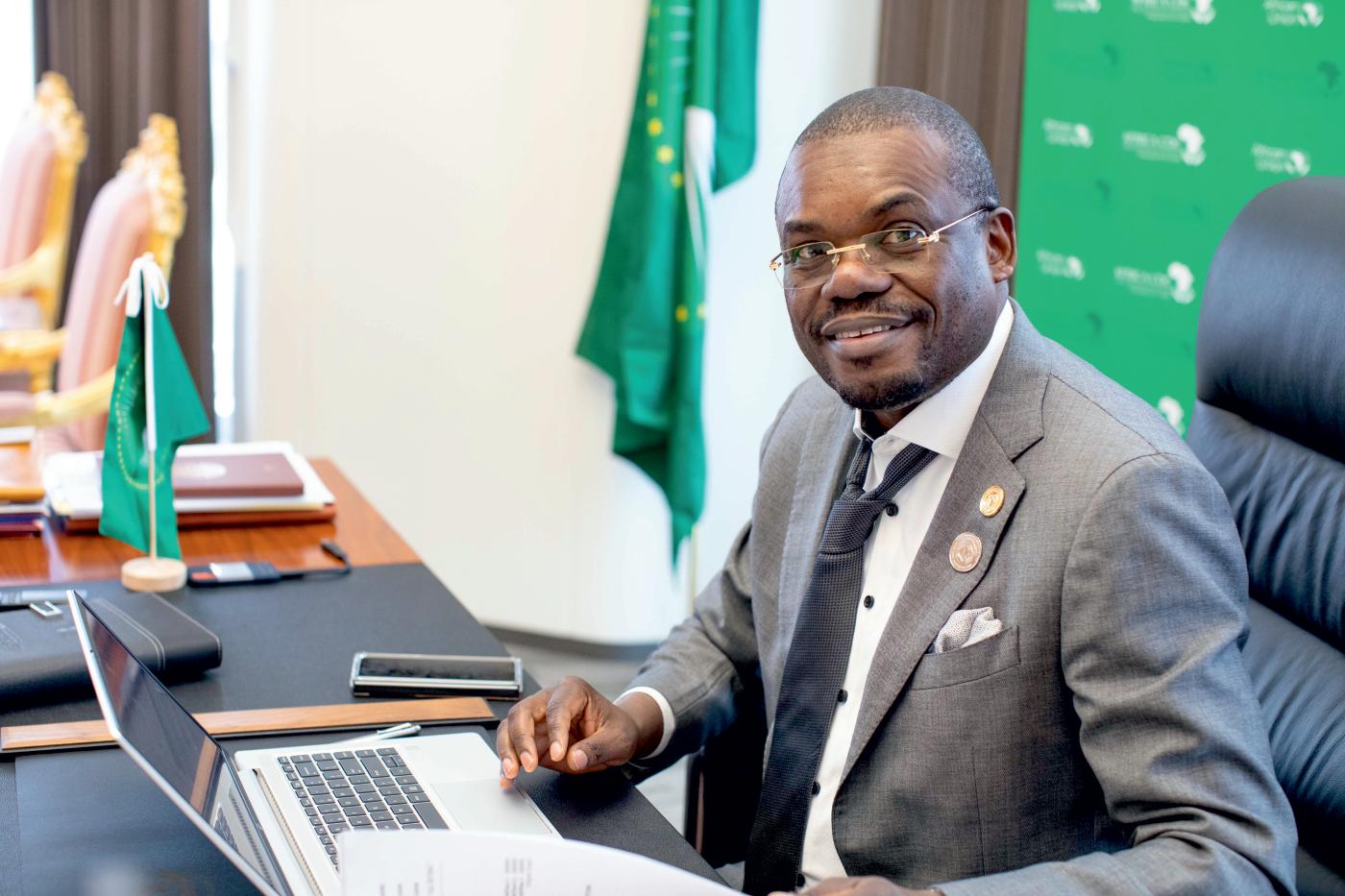
Jean’s leadership approach is collaborative, adaptable, and outcome-focused. He believes in empowering teams, building meaningful partnerships, and harmonizing innovation with practical strategies His dual focus on strategicvisionandhands-onimplementationenableshimto meetthecomplexdemandsofleadingAfricaCDC.
Central to his collaboration strategy is transparent communication. Jean ensures goal alignment, regular progress reviews, and mutual respect in all partnerships. Shared ownership of outcomes, he asserts, builds trust and long-lastingresults.
JeaniscommittedtomaintainingAfricaCDC’sleadershipin global disease control through investments in digital platforms, genomic sequencing, and capacity-building
programs. Collaborations with academic institutions and health agencies strengthen Africa’s preparedness and responsiveness.
Training and retaining skilled professionals remain top priorities. With dynamic health threats on the rise, Jean advocates for continuous innovation, assertive engagement, and flexible strategies that empowerAfrican nations to lead theirownpublichealthresponses.
ForJean,globalhealthleadershipdemandsablendofvision, resilience, empathy, and cultural sensitivity The ability to work across cultures, communicate effectively, and make data-informed decisions is key Leaders must also remain open to learning and adapting—traits he exercises daily amidstthepressuresandunpredictabilityofhisrole.

As Director General, Jean spends about 23 days a month traveling.Tomaintainmentalwell-being,hedelegateswhen necessary, practices daily meditation, and prioritizes time with family. He finds joy in cooking, hosting friends, and listening to music, though he no longer finds time for Scrabble,afavoritepastime.
Jeanemphasizesthatclearvision,measurableoutcomes,and transparencyareessentialinfosteringstrongdonorrelations. Donors need to see the tangible results of their support. Consistent updates, openness in resource management, and acknowledgmentofcontributionsarecrucialtobuildingtrust andlong-termcollaboration.
With a four-year term and potential for renewal, Jean is focusedoncreatinganempowered,autonomousAfricaCDC
that plays a central role in global health governance. His legacyisoneofresilience,self-reliance,andinclusiveaccess tohealthcareacrossAfrica.
He envisions a future where Africa leads in the local manufacturing of health supplies, funds its health systems domestically, and ensures no one is left behind. As global challenges grow, he believes increased solidarity—within Africaandglobally—iscritical.
“COVID-19 was a wake-up call,” Jean says. “It showed us thatwhathappensinonecountrycanquicklyimpacttheentire world The future of public health depends on unity, cooperation,andasharedcommitmenttohumanity.”

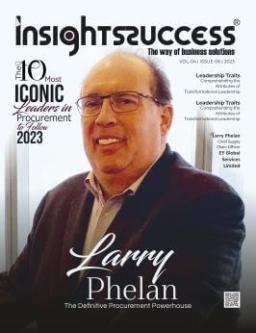


www.insightssuccessmagazine.com


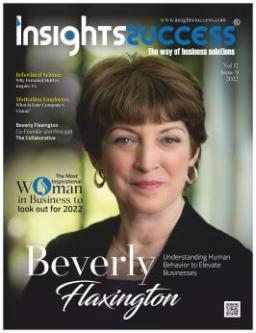






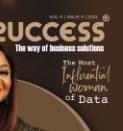

The field of healthcare has witnessed a profound transformation in recent decades, largely driven by relentless advancements in medical innovation. These developments have significantly enhanced the ability of healthcare professionals to diagnose, treat, and manage diseases with greater precision and efficiency than ever before.Therippleeffectsoftheseinnovationsextendbeyond clinical outcomes to fundamentally improve the overall patient experience, fostering a more patient-centered approach to care. As technology evolves and scientific understanding deepens, the healthcare industry continues to shift towards more personalized, efficient, and effective patient care models that address the unique needs of individualsacrossdiversepopulations.Theneedformedical innovationhasbecomeparticularlypressinginthecontextof an aging global population and the rising prevalence of chronic diseases such as diabetes, cardiovascular disorders, and cancer. These health challenges demand not only new therapiesbutalsosmarter,moreadaptablehealthcaredelivery systems.
Oneofthemosttransformativeaspectsofmedicalinnovation is the evolution of diagnostic technologies. Accurate and timely diagnosis forms the cornerstone of effective patient care, guiding clinical decisions and shaping treatment strategies.Traditionaldiagnosticapproaches,oftenrelianton basic imaging and laboratory tests, have given way to sophisticatedmodalitiesthatprovideunprecedentedlevelsof detail and accuracy Technologies such as high-resolution imaging, molecular diagnostics, and point-of-care testing have revolutionized the detection and monitoring of a wide range of medical conditions. The integration of artificial intelligence (AI) and machine learning into diagnostic workflowsrepresentsasignificantleapforward.
AIalgorithmsarenowcapableofanalyzingcomplexdatasets, including radiologic images, pathology slides, and genomic


information, with remarkable speed and precision. These tools assist clinicians in identifying subtle patterns or early markersofdiseasethatmightbemissedthroughconventional analysis. For example, AI-powered imaging systems can detectearly-stagetumorsorvascularabnormalities,enabling interventionbeforeconditionsprogresstomoreseverestages. This level of diagnostic precision not only improves patient outcomesbutalsoreducesunnecessarytestingandassociated healthcare costs. Moreover, advances in molecular diagnostics have allowed for the identification of specific biomarkers linked to various diseases. These biomarkers provide insights into the biological processes driving an illness, enabling personalized risk assessments and tailored treatmentplans.
Personalized medicine has emerged as a revolutionary approachthattailors’treatmenttothegenetic,environmental, andlifestylecharacteristicsofeachpatient.Unliketraditional medical models that apply generalized treatment protocols, personalized medicine leverages detailed patient data to customize therapies that maximize efficacy and minimize adverse effects This approach is made possible by breakthroughsingenomics,proteomics,andotherbiomedical fields that provide deep insights into the molecular underpinningsofdiseases.
In oncology, personalized medicine has dramatically improvedsurvivalratesandqualityoflifeformanypatients. Targeted therapies and immunotherapies, designed to attack specific genetic mutations or activate the patient’s immune system against cancer cells, have replaced or supplemented conventional chemotherapy and radiation. These therapies are often more effective and less toxic, allowing patients to maintain better overall health during treatment The principles of personalized medicine extend beyond cancer care,withgrowingapplicationsincardiology,neurology,and raregeneticdisorders,wheretreatmentregimensareadapted basedonindividualmolecularprofilesanddiseasepathways. Beyond drug development, personalized medicine also encompassesadvancesinpharmacogenomics,wheregenetic testing helps predict how patients will respond to specific medications.
Theadventofdigitalhealthtechnologieshasbeenacatalyst for change in how patients engage with healthcare systems
and manage their own health. Tools such as telemedicine platforms,wearablehealthdevices,mobileapplications,and remote monitoring systems are making healthcare more accessible, convenient, and continuous. These technologies not only facilitate timely medical consultations but also enable patients to actively participate in their health managementthroughreal-timedatacollectionandfeedback. Telemedicine, in particular, has expanded access to care by overcominggeographic,physical,andtemporalbarriers.
Patients in remote or underserved areas can now consult specialists without the need for extensive travel, reducing delays in diagnosis and treatment. Wearable devices track vital signs, physical activity, sleep patterns, and other health metrics,empoweringindividualswithactionableinsightsinto their well-being These data streams allow healthcare providers to monitor patients remotely, detect early warning signs of deterioration, and intervene promptly.Additionally, digital health platforms enhance communication between patients and healthcare teams, facilitating shared decisionmaking and personalized care planning. Patient portals and health apps provide access to medical records, test results, medication schedules, and educational resources, helping patientsstayinformedandengaged.
Medical innovation is fundamentally reshaping patient care by driving advancements in diagnostics, enabling personalized therapeutic strategies, and leveraging digital technologies to enhance patient engagement These innovations contribute to a more precise, efficient, and patient-centered healthcare system that not only improves clinicaloutcomesbutalsoenrichesthepatientexperience.As the pace of medical innovation continues to accelerate, the future of patient care holds the promise of even greater breakthroughs that will transform healthcare delivery on a global scale, ensuring healthier lives for individuals and communitiesalike.








